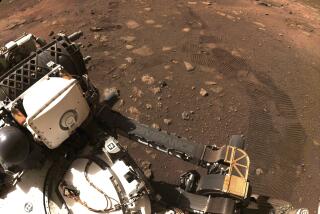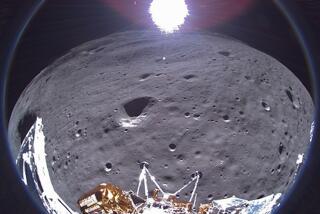Pluto’s moons named Kerberos and Styx, despite vote for Vulcan
Sorry, William Shatner. The International Astronomical Union decided not to name either of Pluto’s two smallest moons after Mr. Spock’s home planet of Vulcan, despite an online campaign that garnered global support for the “Star Trek” star’s suggestion.
Vulcan was the top vote-getter during a “Pluto Rocks” contest to come up with official names for the moons previously known as P4 and P5. According to results released by election organizer Mark Showalter, a planetary astronomer with the SETI Institute, Vulcan blew away the competition with 174,062 votes from people all over the world.
Coming in a distant second with 99,432 votes was Cerberus, the Roman name for the three-headed dog that guards the entrance to the underworld in classical mythology. Third place went to Styx, the Greek name for the river separating Earth from the underworld, with 87,858 votes.
“They didn’t name the moon Vulcan. I’m sad.” Shatner tweeted Tuesday morning after the IAU announced its decision. (In an earlier tweet, he noted that “Vulcan won in a landslide.”)
Instead, the IAU -- which describes itself as “the internationally recognized authority for assigning designations to celestial bodies and surface features on them” -- went with Kerberos for P4 and Styx for P5. Kerberos is the Greek version of Cerberus; the name was changed “to avoid confusion with an asteroid called 1865 Cerberus,” the IAU explained in Tuesday’s announcement.
Cerberus and Styx were leading the contest until Shatner suggested Vulcan in a Feb. 12 tweet. He also proposed the name Romulus, in honor of the home planet of the Star Trek beings known as Romulans. But that never even made it to the online ballot, because the solar system already has a moon named Romulus -- it orbits the asteroid Sylvia, along with another moon called Remus.
What about Vulcan? This was tricky too, because the name had already been used to describe a planet once thought the orbit even closer to the sun than Mercury. The hypothetical planet never materialized, but the name stuck.
“Although this planet was found not to exist, the term ‘vulcanoid’ remains attached to any asteroid existing inside the orbit of Mercury, and the name Vulcan could not be accepted for one of Pluto’s satellites,” the IAU said.
Shatner wasn’t having it.
“So they name a moon Kerebus because there’s already a Cerebus asteroid but a mythological planet knocks out Vulcan?” he tweeted.
Later, Shatner accused the powers-that-be of being partial to “Star Wars”: “Where’s Fisher?!!! She’s been too quiet lately.”
That was followed by: “Star Trek fans have had it rough. First JJ blows up Vulcan and now SETI finds a loophole to deny it from coming back!” (Actually, Capt. Kirk, it was the IAU’s decision. SETI only ran the online election.)
Science and Health: Sign up for our email newsletter
The IAU noted another problem with Vulcan. Pluto is the Greek name for the ruler of the underworld -- he was the brother of Zeus, ruler of the heavens, and Poseidon, ruler of the seas -- and Pluto’s other three moons have underworld-themed names too. There’s Charon, who ferries souls of the dead across the rivers Styx and Acheron; Nix, goddess of the night and mother of Charon; and Hydra, the nine-headed monster who served as guardian of the underworld. Vulcan would have been an outlier.
“Vulcan does not fit into the underworld mythological scheme,” the IAU announcement said.
Kerberos and Styx were discovered in 2011 and 2012, respectively. They appeared in images of the Pluto system taken by the Hubble Space Telescope in preparation for the 2015 visit by NASA’s New Horizons spacecraft. New Horizons is more than halfway to the dwarf planet. After its rendezvous with Pluto, it will travel to the Kuiper Belt, the source of many of the solar system’s comets.
In a Google+ hangout, SETI’s Showalter suggested that New Horizons may find a crater in the Pluto system worthy of naming after Capt. Kirk, Mr. Spock or other “Star Trek” characters.
Shatner was not appeased. “Did you hear the consolation?” he tweeted. “They may name a crater after Kirk. A pockmark on a planetoid is a fitting tribute? (Rolling my eyes).”
Return to Science Now.







